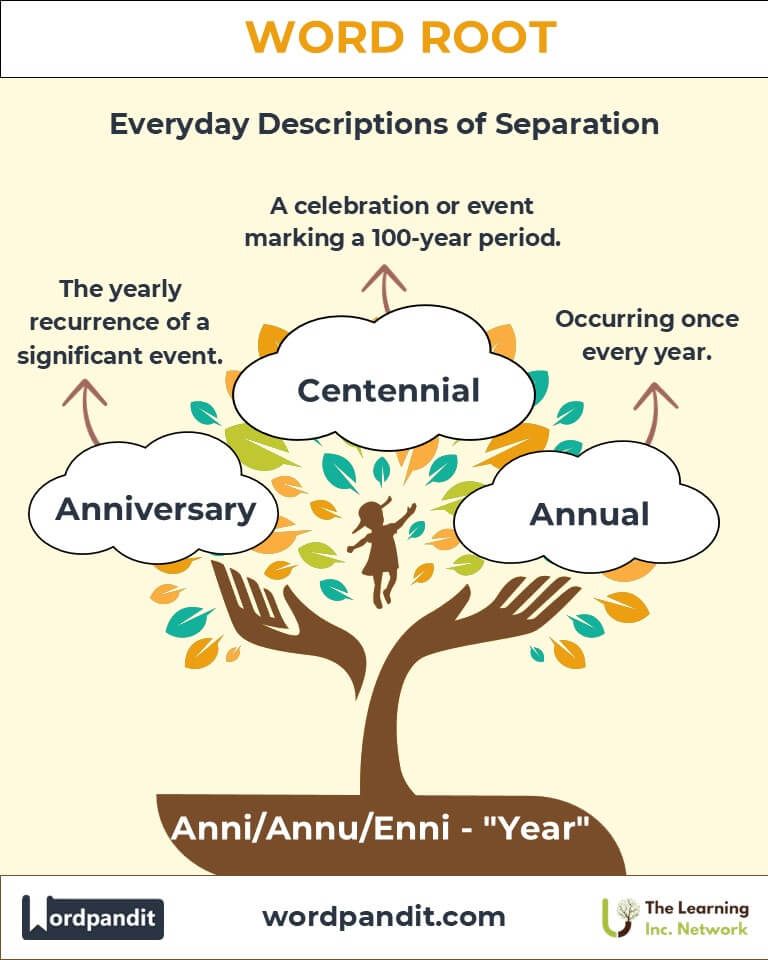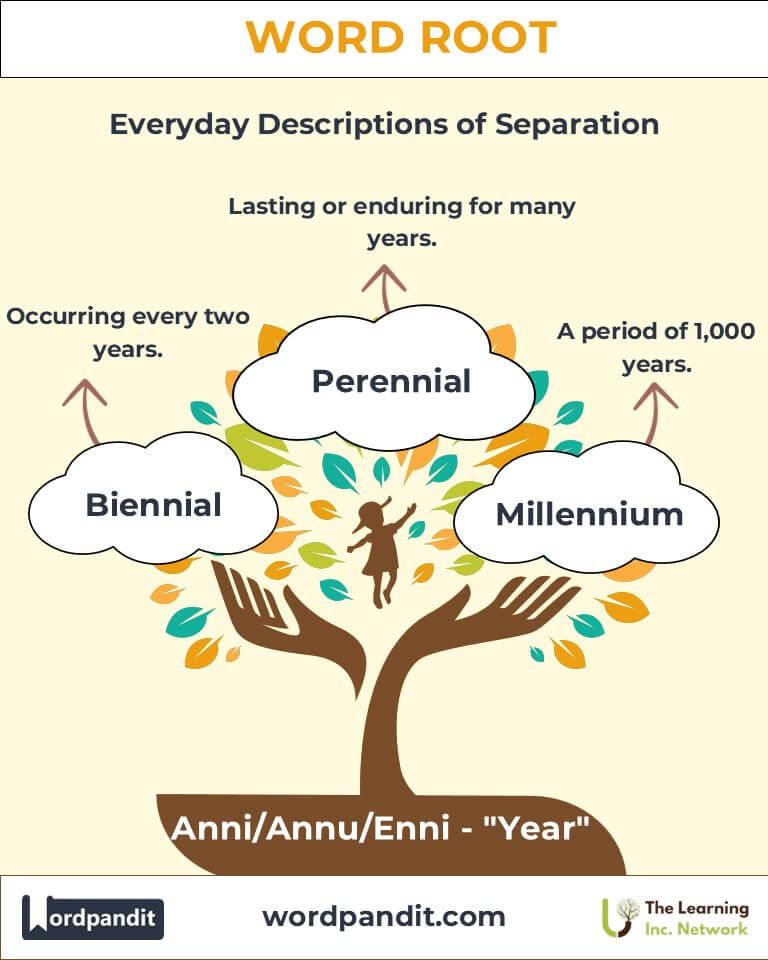Anni/Annu/Enni: Timeless Foundations in Language and History
Byline: Discover the enduring charm of the roots "Anni," "Annu," and "Enni," derived from Latin and symbolizing the concept of time and years. From "anniversary" to "centennial," these roots encapsulate humanity's connection to cycles, history, and longevity.

Table of Contents
- Introduction: The Timeless Significance of Anni/Annu/Enni
- Etymology and Historical Journey
- Mnemonic: Unlocking the Power of Anni/Annu/Enni
- Common Anni/Annu/Enni-Related Terms
- Anni/Annu/Enni Through Time
- Anni/Annu/Enni in Specialized Fields
- Illustrative Story: Anni/Annu/Enni in Action
- Cultural Significance of Anni/Annu/Enni
- The Anni/Annu/Enni Family Tree
- FAQs About the Anni/Annu/Enni Root
- Test Your Knowledge: Anni/Annu/Enni Mastery Quiz
- Conclusion: The Living Legacy of Anni/Annu/Enni
1. Introduction: The Timeless Significance of Anni/Annu/Enni
When you hear "annual report" or "centennial celebration," you're engaging with the Latin roots "Anni," "Annu," and "Enni," which all relate to time and yearly cycles. Pronounced as an-nee (Anni), an-noo (Annu), and en-nee (Enni), these roots are cornerstones of language, linking us to time’s passage and the rhythm of life. They feature prominently in discussions of history, commemoration, and planning, reflecting humanity's age-old fascination with cycles and continuity.

2. Etymology and Historical Journey
The roots "Anni," "Annu," and "Enni" trace their origins to the Latin word annus, meaning "year." This ancient root gave rise to words marking the passage of time, from religious observances to governmental planning. The Roman calendar and festivals heavily emphasized annual cycles, embedding "Anni/Annu" in cultural and administrative traditions. Over centuries, these roots spread through Old French into English, expanding their usage to include celebrations (anniversary), intervals (biennial), and grand milestones (millennial).
3. Mnemonic: Unlocking the Power of Anni/Annu/Enni
To remember Anni/Annu/Enni, picture a calendar circling through the seasons, year after year, marking anniversaries, plans, and milestones.
Mnemonic: “Anni, Annu, and Enni turn the wheel of time—marking annual plans, centennial celebrations, and millennial memories.”
4. Common Anni/Annu/Enni-Related Terms
- Anniversary (an-uh-vur-suh-ree): The yearly recurrence of a special event.
Example: "Their 50th wedding anniversary was celebrated with great joy." - Annual (an-yoo-uhl): Occurring once every year.
Example: "The annual gala raised funds for local charities." - Biennial (by-en-nee-uhl): Happening every two years.
Example: "The art festival is a biennial event, drawing global artists." - Perennial (puh-ren-nee-uhl): Lasting for many years or enduring.
Example: "Her perennial optimism inspired everyone around her." - Centennial (sen-ten-nee-uhl): A 100-year anniversary or celebration.
Example: "The museum marked its centennial with a grand exhibit." - Millennial (mi-len-nee-uhl): A person born near the turn of the millennium, or something lasting 1,000 years.
Example: "The castle stood as a millennial symbol of resilience."
5. Anni/Annu/Enni Through Time
- Annals: Originally referring to yearly historical records, this term now represents any chronological documentation.
Example: "The annals of medicine record groundbreaking discoveries." - Triennial: This term, denoting events every three years, has become significant in arts and academic conferences.
Example: "The triennial symposium showcased innovative research." - Millennium: Once a marker of eschatological beliefs, it now often symbolizes technological or cultural milestones.
Example: "The new millennium sparked global celebrations."
6. Anni/Annu/Enni in Specialized Fields
- Botany: Perennial plants endure across multiple years, symbolizing resilience and life cycles.
- History and Culture: Centennial milestones commemorate significant national or institutional achievements.
- Literature: Terms like annals structure historical narratives, providing a lens into time’s passage.
- Finance: Annual budgets guide fiscal planning and sustainability.
7. Illustrative Story: Anni/Annu/Enni in Action
In a small village preparing for its centennial festival, generations collaborated to plan the event. The annual fairground was transformed, with perennial gardens blooming as a nod to longevity. Meanwhile, the historian compiled annals of village life, preserving stories for the next millennium. This communal effort celebrated the enduring power of the Anni/Annu/Enni roots, linking past, present, and future.
8. Cultural Significance of Anni/Annu/Enni
From ancient Roman festivals to modern millennial celebrations, Anni/Annu/Enni roots are woven into the fabric of human tradition. They help societies mark time, honor achievements, and connect generations. In literature, phrases like "annals of history" evoke humanity's enduring quest to record and understand its past.

9. The Anni/Annu/Enni Family Tree
- Chron (Greek: "time"):
Example: Chronology – The arrangement of events in time. - Temp (Latin: "time"):
Example: Temporal – Relating to worldly, as opposed to spiritual, time. - Dia (Greek: "through"):
Example: Diary – A daily record of events.

10. FAQs About the Anni/Annu/Enni Root
Q: What does "Anni/Annu/Enni" mean?
A: These roots mean "year," "time," or "cycles." Derived from the Latin word annus, they signify the recurring passage of time, as seen in words like annual (yearly) and centennial (a 100-year milestone).
Q: What is the origin of the word "anniversary"?
A: The term comes from the Latin anniversarius, meaning "returning yearly." It is used to mark the yearly recurrence of significant events, such as birthdays or weddings.
Q: How does "centennial" differ from "millennial"?
A:
- Centennial: Refers to a 100-year anniversary or period, often celebrated for historical milestones.
- Millennial: Can describe something lasting 1,000 years or the generation born near the year 2000.
Q: What does "perennial" mean beyond plants?
A: While commonly used to describe plants that live for multiple years, perennial can also refer to ideas, qualities, or situations that endure or are constantly recurring, such as "perennial challenges."
Q: What is the meaning of "biennial" versus "biannual"?
A:
- Biennial: Occurs every two years, such as certain festivals or international events.
- Biannual: Happens twice a year, such as financial reports or magazine issues.
11. Test Your Knowledge: Anni/Annu/Enni Mastery Quiz
1. What does the root "Anni/Annu/Enni" signify?
2. Which term refers to an event occurring every two years?
3. What do "annals" typically refer to?
4. Which word describes plants that live and grow for multiple years?
5. What does "millennial" refer to?
12. Conclusion: The Living Legacy of Anni/Annu/Enni
The roots Anni/Annu/Enni embody humanity’s relationship with time, from commemorating milestones to envisioning the future. Their relevance transcends disciplines, reminding us of the cycles that govern life. As time continues its ceaseless march, these roots will remain integral to the languages that chronicle our journey through history.












